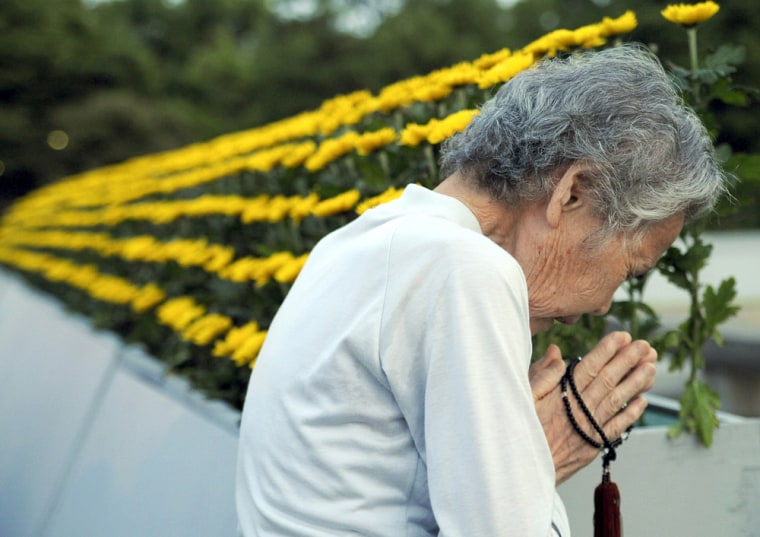Hiroshima's mayor urged the next U.S. president to support a proposed ban on nuclear weapons Wednesday, as Japan marked the 63rd anniversary of the atomic blast that obliterated this city and killed 140,000 people.
At the ceremony, Hiroshima Mayor Tadatoshi Akiba also announced the launch of a two-year study to gauge the psychological toll of the Aug. 6, 1945, attack in the closing days of World War II.
Japan submitted a resolution in the United Nations last year calling for the abolition of nuclear weapons. Akiba said that 170 nations supported it, with the United States as one of only three countries opposed.
"We can only hope that the U.S. president elected this November will listen conscientiously to the majority," Akiba told a crowd of 45,000 that included survivors, local residents and dignitaries from around the world.
A deadly legacy
Akiba addressed the crowd with the bombed-out dome of the Hiroshima Peace Memorial looming in the background, and hundreds of doves were released into the air after he finished his speech.
A moment of silence was observed at 8:15 a.m. (2315 GMT Tuesday), which was the time of the blast. An estimated 140,000 people were killed instantly or died within a few months after the American B-29 bomber Enola Gay dropped its deadly payload. Japan's official death toll of nearly 260,000 includes injured who have died in the decades since.
Three days later, on Aug. 9, 1945, the U.S. dropped a plutonium bomb on the city of Nagasaki, killing about 80,000 people. Japan surrendered on Aug. 15, ending World War II.
Psychological wounds
Akiba said more needs to be done for the remaining survivors, whose average age is now over 75. There are about 244,000 survivors, according to the health ministry. Many have developed illnesses caused by radiation exposure, including cancer and liver diseases.
"The most severely neglected have been the emotional injuries," Akiba said, in announcing the new two-year psychological study.
Prime Minister Yasuo Fukuda also spoke at the ceremony, emphasizing Japan's continued policy against using nuclear weapons or allowing them onto its territory.
"We will lead the international community toward the abolishment of nuclear weapons and lasting peace," he said.
The ceremony was held against a backdrop of growing concern about the U.S. military presence in Japan and its nuclear-powered vessels.
The U.S. Navy said last week that one of its nuclear-powered submarines had leaked minimally radioactive water earlier this year — possibly when it made port calls in Japan. Local authorities said they detected no abnormal increase in radioactivity, but the news and its delayed announcement drew strong criticism from citizen groups.
Also, next month the first U.S. nuclear-powered ship to be stationed permanently in Japan, the aircraft carrier USS George Washington, is scheduled to arrive in Yokosuka, just south of Tokyo. The carrier's arrival originally was set for August under a Japan-U.S. security alliance, but was delayed because of a fire aboard the vessel in May.
The George Washington is relieving the soon-to-be decommissioned USS Kitty Hawk. Its deployment had already triggered protests, and the fire brought new concerns.
Ceremonies will also be held on Saturday in Nagasaki.
